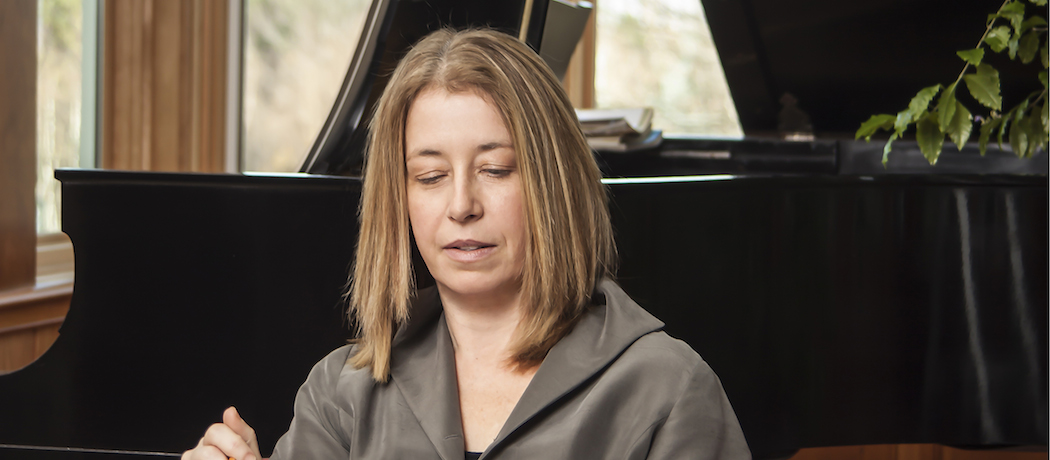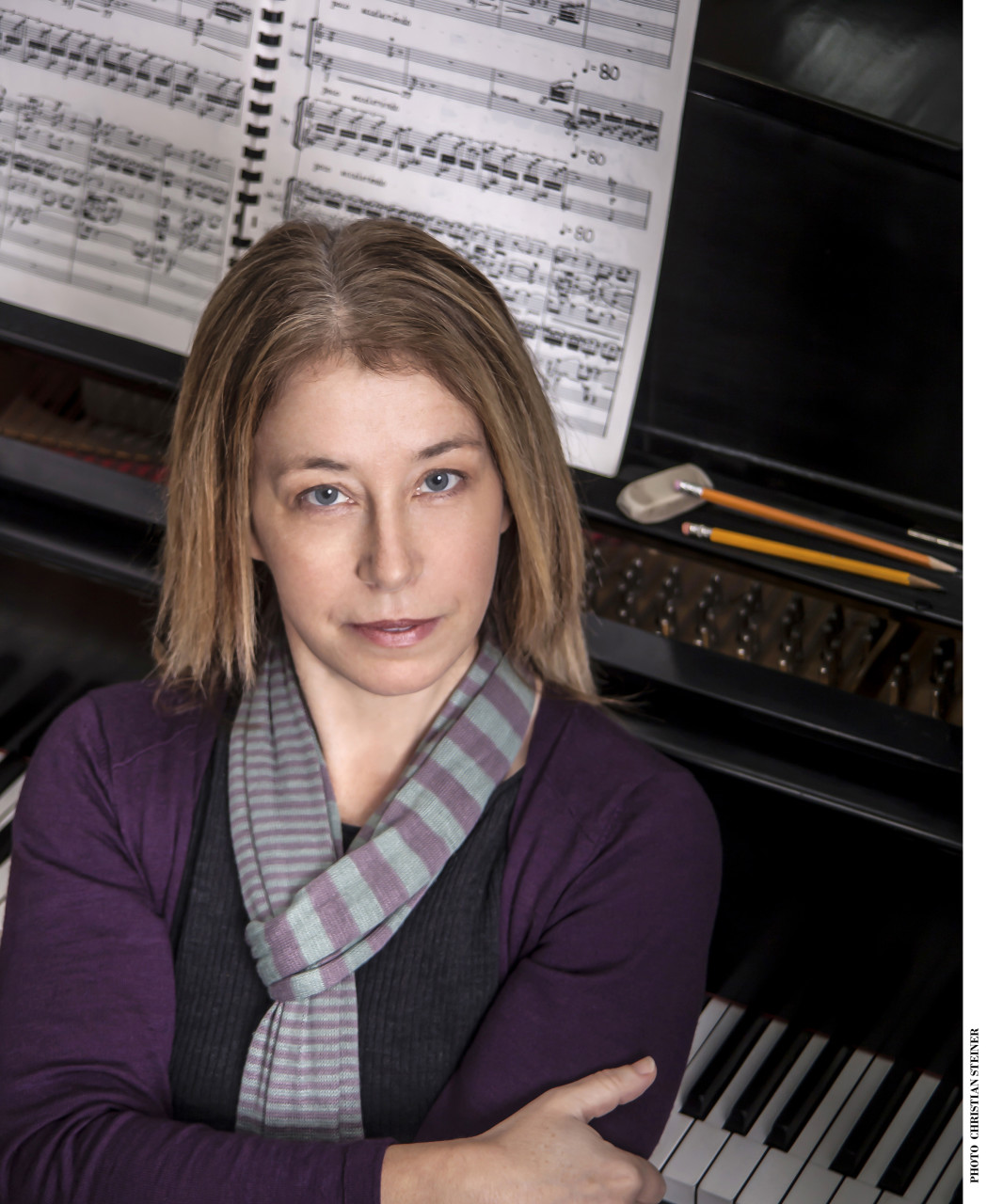Advertisement
Composer Elena Ruehr Will Have A November To Remember With Three Premieres

Most composers are happy to have one premiere of a major work every year. Elena Ruehr has three in November alone.
Ruehr, a longtime MIT professor whose previous compositions include the opera “Toussaint of the Spirits,” six string quartets, and numerous collaborations with poets and novelists, sees a trifecta of her works premiered this month.
Two of them take place in Boston: a performance of “Eve” by the Cantata Singers at Jordan Hall Nov. 8, and her a cappella opera “Cassandra in the Temples” Nov. 21, sung by the adventurous vocal ensemble Roomful of Teeth at MIT’s Kresge Auditorium. A third premiere, a chamber setting entitled “It’s About Time,” debuts Nov. 16 and will be performed by the San Francisco Contemporary Music Players as part of their ambitious year-long Project TenFourteen.
“You’re always nervous when you’re working with voices. You just don’t know how it will turn out. With ‘Eve’ I’m writing for a soprano and a baritone that I have not worked with yet,” Ruehr says about the Boston premieres.
“With Roomful of Teeth, I’m writing for voices that do extended techniques like throat singing, some Bulgarian women’s choir effects, and some vocal percussion—plus they use microphones. A lot of which isn’t familiar to me at all. I sing all my parts when I’m writing something, but you just don’t know what it will sound like.”
“Eve” came about after a phone call with Cantata Singers’ director David Hoose. “He called and said, ‘I’m not sure if you want to do this,’ and I kept saying, ‘I do, I do,’” Ruehr says. “He wanted something from sacred or religious texts, and I’m a secular humanist. So I had to think about how I was going to fit it into my own voice.
“When I was 12 years old I read the story of Eve, from Genesis 3. I read it like text, not with the religious context. So I went back to that, and found this amazing cantata in the story."
Ruehr’s music has always had a close relationship to text. Multiple settings have come from Langston Hughes, Emily Dickinson, Louise Glück, Adrienne Rich, Elizabeth Alexander and others. Ruehr says she doesn’t always directly set words to music, as she does with “Cassandra” and “Eve,” but “captures a story in snapshots.” Dance has also been a longtime inspiration. Her music is almost always accessible, with an emotional directness on the surface and rhythmic and contrapuntal complexities bubbling underneath.

Ruehr’s opera, “Cassandra in the Temples,” had a more complicated beginning.
“I had met (librettist) Gretchen Henderson when she was a post-doc at MIT,” she says. “She heard me talk, and said that she wanted to do an opera with me. At first I said, ‘No way.’ I know how complicated it can be. Then I saw her work—she does some really interesting things—and we started to brainstorm. Originally I wanted to do an opera that was just voices and dancers—just the elemental human activities—and we started talking about Cassandra. And then I heard Roomful of Teeth, and I thought, ‘This group can pull it off.’”
Director Brad Wells founded the eight-member vocal ensemble in 2009. The group’s repertory ranges from classical settings to yodeling to Inuit throat singing. Roomful of Teeth, which has had five residencies at Mass MoCA, won a Grammy last year for best chamber music performance. To top it off, one of the singers, Caroline Shaw, became the youngest composer ever to win a Pulitzer Prize in 2013 with her “Partita for 8 Voices.”
“I heard ‘Partita,’ and I wanted to meet the group,” Ruehr says. “I got in touch with them, and they said they would do it. At first I was going to have a whole year to write the opera, but then after the Grammy they got so famous it had to be pushed up. I started writing it in February, and sent them the score in September.”
Roomful of Teeth will be in residence at MIT for the entire week before the performance of “Cassandra,” rehearsing, teaching and training singers.
“It’s not your standard opera,” Ruehr says. “The text is experimental, like a collage. When I talked to Gretchen about it, ‘Cassandra’ seemed to us like a very modern story. Gretchen is a very sophisticated musician as well, and the process was a true collaboration. It’s not like she just sent me the words and I wrote the music.
“We went back and forth. She really is up on things: at one point she said something like, ‘when this deceptive cadence happens here we really need more time for the text.’ We are both interested in hearing the text sung, because the sound is a big part of the meaning.”
If three premieres are not enough, there will also be a performance at the Festival of New American Music in Sacramento on Nov. 12 (“Blackberries,” with the Fidelio Trio). There’s a couple of new recordings: “O’Keeffe Images,” with the Boston Modern Orchestra Project, was just released in October, and a collaboration with violinist Irina Muresanu is due out in January.
Ruehr was awarded a Guggenheim Fellowship to complete “Cassandra in the Temples,” allowing her to take a semester off from her teaching obligations.
“It’s just as well,” she says. “I’ve got enough going on. Even though the opera is already written, I’m still in rehearsal for all of these things for the entire month. ”
Keith Powers, former music critic at the Boston Herald, now freelances for a number of newspapers and magazines. Follow him on Twitter @PowersKeith.
More



